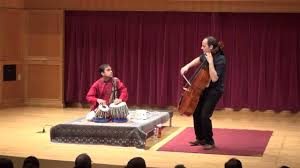…that I’ve ever been at…
This was the DePauw School of Music 21Cymposium, held the weekend before last. I gave the keynote talk, but…later for that. What inspired me about this event wasn’t anything I said, but who I said it to: an audience of classical music changemakers.
And, even more, the other presenters were inspiring. Like my friend Sarah Robinson. Someone who’s built a new kind of classical music career, starting with playing classical music in clubs. And who knows club gigs inside out, so much so that she wrote an essential book on how to do them.
(Full disclosure: I wrote the introduction. But only to support Sarah and the book. I get nothing if you buy it.)
Sarah talked about her career. How she’d been a classical flute player, doggedly learning her orchestral excerpts. Until she realized that didn’t make her happy
So what else could she do? Her career is the answer…an ensmeble that plays club dates in LA, session work there, concerts she organizes, plus classical gigs. She’s happy. Wouldn’t want another life. Though of course her conservatory training didn’t teach her to have a life like that.
And then…
 Mike Block! Cellist. Plays in the Silk Road Ensemble, has a crazy project where he records the Bach suites in the bathrooms of major concert halls (really). Invented the Block Strap, which lets him play the cello standing up, the instrument strapped to his chest, becoming just about part of his body.
Mike Block! Cellist. Plays in the Silk Road Ensemble, has a crazy project where he records the Bach suites in the bathrooms of major concert halls (really). Invented the Block Strap, which lets him play the cello standing up, the instrument strapped to his chest, becoming just about part of his body.
Came out on stage at DePauw, said he was going to play “an international piece.” Launched into one of the Bach suites, radiant playing, moving all over the stage, almost levitating, the music levitating, too. Joyful musicmaking.
“That was a piece by a German composer,” he said, “based on a French dance, played on an Italian instrument.” And then he went through everything the cello is made of, and where the material came from. All over the world.
Which was fun, but more than fun, because it let classical music be what, in the end, it is — not some creation high on a mountaintop, butt one of the world’s musics, taking its place alongside the others.
Mke talked about his career. Conservatory. Not fun. Then how he freed himself. With one key point — his cello technique never clicked in, he said, until he learned to improvise.
But maybe the most astonishing…
…presentation was by David Wallace, head of the string department at the Berklee College of Music. Berklee: the place you go to learn pop, jazz, record production. But they started getting interest from classical string players, who wanted to go to college for violin or cello, but didn’t only want to play classical music.
Berklee, quick on the draw, beefed up its string program. Got David to run it, a perfect choice — classical violist and composer, folk fiddler, rock player, much, much more
He first showed a video I’d seen before, about the program. Starts with a harpist, who’d always wanted to play jazz. He went to Berklee. He plays jazz now.
But then David told us something…well, truly astonishing. At Berklee, all the string students can and do study with all the string faculty. Who teach all kinds of music, so the students learn all kinds of music.
Teaching and learning strings becomes a community enterprise. Before David got there, the school hired David hires Simon Shaheen, an oud virtuoso (who also plays jazz and much else). Now students from the Middle East come to Berklee. And join the fun! Everyone now can play Middle Eastern music with one of its leading performers. And the Middle Eastern players, of course, can join in everything else.
David’s never had so much fun in his life. Oh, and Mike Blocck teaches there, too.
What this means…
I haven’t drawn any morals in what I’ve said, because the conclusions are obvious. The conservatory education we’re used to (and which many of us went through) has its merits. You learn something.
But you learn one thing, and — against the larger canvas of music — it can be limiting. A new generation breaks free of that.
And, as I’ll say in another post, the conservatories — almost with a sigh of joy and relief — are starting to follow.
I’ll put the full text of my keynote up here later on, plus a link to a video, when DePauw makes one available.
